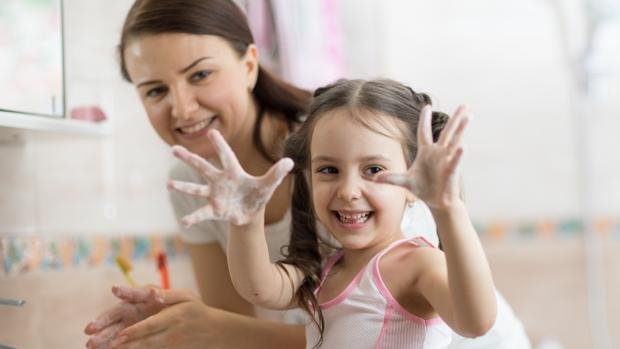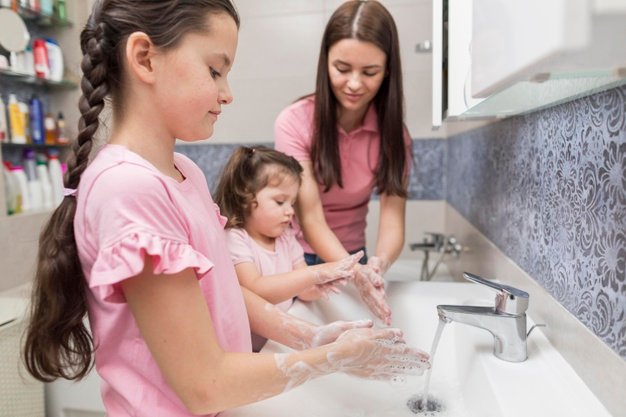Adults should not only learn to perform the hand washing procedure correctly, but also teach their children to do it correctly.

Souerce
The procedure for washing hands should be like this.
By hand soaped on both sides, interdigital spaces are necessarily processed. At least twenty seconds after lathering, hands should be thoroughly rinsed under running water, after which it is recommended to dry them with a towel.
A very useful habit is washing your hands. For some people it is a mandatory element of personal hygiene, others use it only when it is already openly "necessary". And this applies to both men and women.
Why wash your hands?
It is to keep them clean! And purity is a guarantee of health. Try to show the child clearly that it is our hands that we “use” all the time: we touch everything, we open-close, we take ... There may be dirt on our hands, which is visible and which is not visible. It is this dirt that is dangerous to health; Explain what would happen if, for example, he takes an apple with dirty hands and eats it.
How do you teach your child to wash their hands?

Souerce
You can explain to the child that germs, even if we don't see them, enter the body, interrupting their work. If an eye was stung and the child, without thinking, scratched it with a dirty hand, there is a possibility that it will become red and hurt, since there are also germs.
During epidemics, when everyone sneezes, coughs and takes everything with their hands, and there the contagion begins.
Perhaps the most dangerous and unpleasant option is the possibility of contracting parasites. Tell children about these "worms", just take into account the peculiarities of your child's psyche.
When is it necessary to wash your hands?
· - after arriving from the street;
· - after visiting the bathroom;
· - after communicating with pets;
· - in the morning and in the evening, before starting to wash your face;
· Before and after any meal.
It would seem that everything is clear, but even many adults for some reason "forget" to wash their hands at the right time. What can we say about the children? If a child does not want to wash their hands, adults should take some time to establish a strong connection in the child's head between these "must-do" situations and an understanding of the need to wash their hands.
How can you keep your hands clean?

Souerce
· Above all, show your child your own personal hygiene example more often. If before you were only going to wash your hands, eventually, now do it more frequently and so that the child can observe it.
· Tell your child about the dangers of dirty hands in a language they understand, but don't make the situation absurd. Explain that the safest way to protect yourself from dirt and its effects is to wash your hands with soap and water.
· Watch a cartoon with your child that reveals this problem. .
· Make little "reminders" in the form of pictures. Hang them in front of the kitchen entrance, near the front door, near the bathroom. Images must be visible and their purpose is clear to the child.
· Buy soap in the shape of animals, fruits, cars for your child. Let it smell delicious. Also don't forget a towel.
· Ask your child to help you keep track of when the soap runs out and let you know. You can also solemnly assign him a duty every day, for example, at night to change a hand towel in the bathroom.
Touch dispensers for liquid soap are now on sale. They are ideal for children to wash their hands. The child with interest puts his hands under the dispenser and the soap automatically drips into his palms. It only remains to lather your hands and rinse them. Children like this option, so you can take it "on duty".
A little time and patience, and you will definitely be able to consolidate in the child such a useful habit as washing hands, on which her health largely depends.
Teach kids to wash their hands and they'll stay healthy!
Reference:

Supports the educational community